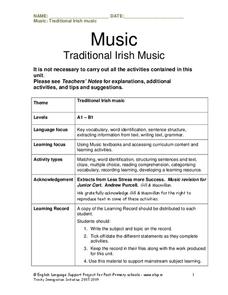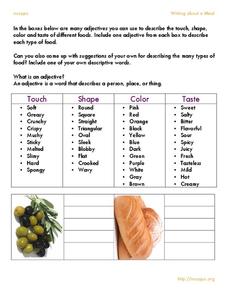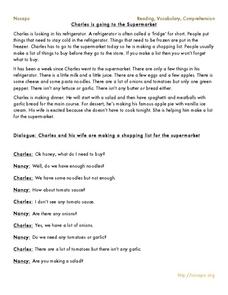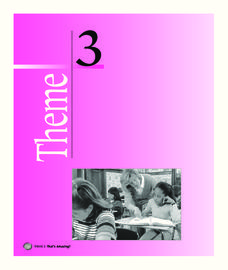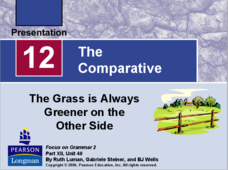K12 Reader
Nouns as Adjectives
Sometimes nouns can do the work of adjectives! Young language arts pupils analyze ten noun phrases and determine which contain adjectives, and which contain nouns that describe other nouns.
K12 Reader
Comparative Adjectives: Words That End in Y
What do messy, dreamy, and lucky have in common? They are all adjectives that trade their -y for -ier in the comparative form! Learners practice the vowel shift with twenty adjectives, all of which end in -y.
K12 Reader
Change the Predicate Adjectives
Review parts of speech and revise writing for clarity with one worksheet! Elementary grammarians change ten predicate adjectives to attributive adjectives, combining two choppy sentences into one smooth thought.
K12 Reader
Change the Adjectives to Nouns
Adjectives are supposed to describe nouns, but they can actually become nouns themselves! Learners review ten adjectives and transform them into the nouns found in their roots.
K12 Reader
Comparatives and Superlatives: Halloween Edition
What's the spookiest thing about Halloween? Which haunted house is ghostlier than the others? A list of Halloween-related adjectives await your elementary learners, along with columns to write the comparative and superlative forms of each.
English Language Support Programme
Traditional Irish Music
Celebrate sean-nós, céilí, and the lilting music of the Emerald Isle with a set of language arts activities! Learners complete word puzzles, vocabulary exercises, and comprehension questions about traditional Irish music.
Prestwick House
Ten Days to A+ Grammar: Verbs
What are you doing today? What have you done this week? What will you be doing next month? Focus on verb usage with a series of fill-in-the-black exercises on basic tenses, inappropriate shifts in tense, and active and passive voice.
K12 Reader
Circle It! Indirect Objects
If you give this worksheet to your class, make sure you know where the indirect object is! Young grammarians work on their grammar skills with a series of ten sentences, each with an indirect object ready for pupils to circle.
Nosapo
Weather and Present Continuous Tense
What's the weather like right now? Is it raining or is it snowing? Using present continuous tense, learners practice describing the weather with weather vocabulary words.
Nosapo
Family Titles, Pronouns, Writing about a Person
How is your grandmother related to you? How is your cousin related to your grandmother? Learn about family relationships and pronouns with an activity that guides pupils to write two short narratives about members of their families.
Nosapo
Verbs: Regular, Irregular, Simple Past Tense
Adding -ed to the ends of most verbs can change a sentence to the past tense—but what about verbs like think or draw? Provide class members with practice activities that focus on both regular and irregular verbs in the simple past tense.
Nosapo
Writing about a Meal
You don't need to be a food critic to describe your meal accurately! A series of activities introduce learners to vivid adjectives when writing about the taste, smell, and feel of food. After working with word choice, parts of a...
Nosapo
Reading, Vocabulary, Comprehension
Whether you teach mainstream elementary classes or older English learners, a set of reading comprehension resources is a great addition to your language arts curriculum. Ten activities each include a reading passage and set of...
Nosapo
Pronouns: Personal Pronouns, Demonstrative Pronouns
Which do you use: that or this? Which or where? Me or I? Practice pronoun use with a series of activities that focus on personal and demonstrative pronouns.
Nosapo
Reading Activity: Circle the Right
Fables can teach us about life's morals, but they are also helpful for reviewing verb tense, spelling, and word choice. Three reading passages feature well-known fables, each with several opportunities for students to circle the correct...
Roald Dahl
Matilda - The First Miracle
As the story unfolds, readers discover Matilda has a superpower. Take part in an activity that has learners talking about what superpower they would have, how they would use it, and how it could help others. Then, after reading the 14th...
Wells Fargo
Wells Fargo History Museum: Curriculum Guide
Learn about the California Gold Rush from an institution that has been in place since the early days of the American West: Wells Fargo History Museum. From domain-specific vocabulary review to group research projects, an expansive packet...
Scholastic
Test-Taking Strategies for Three Subject Areas
Sometimes a test page loaded with text can make a student's face go blank. Help them decipher what a text question is asking with a series of tips focused on reading comprehension, vocabulary, and language arts mechanics.
Houghton Mifflin Harcourt
That’s Amazing!: Extra Support Lessons (Theme 3)
Follow a teach, practice, and apply routine to provide extra support with a themed unit created by Houghton Mifflin. Topics include compound words, noting details, action verbs, suffixes, compare, and contrast, verbs, fantasy, realism,...
Houghton Mifflin Harcourt
That’s Amazing!: English Language Development Lessons (Theme 3)
That's Amazing! is the theme of an English language development unit created by Houghton Mifflin. Following a speak, look, move, and listen routine, scholars delve into topics; seasons, weather, animals, landforms, telling time,...
Worksheet Web
Heteronyms
Challenge scholars to identify and use heteronyms in a sentence with a two-page activity designed to boost grammar skills.
Pearson
The Comparative
A lecture on comparative adjectives is good, but an engaging presentation is better! Take learners through the rules of comparing one thing to another with a slideshow about how some experiences can be better or worse than others.
Pearson
Questions with Any, Some, How Much, How Many; Quantity Expressions
How many times do you need to review quantity expressions? Focus on the words any, how much, some, and how many with an engaging grammar presentation.
Pearson
Advice: Should, Shouldn't, Ought to, Had Better, and Had Better Not
You shouldn't miss out on an opportunity to review should, shouldn't, ought to, had better, and had better not! Elementary and middle schoolers view a slideshow presentation that focuses on usage rules and examples for these tricky verbs.







